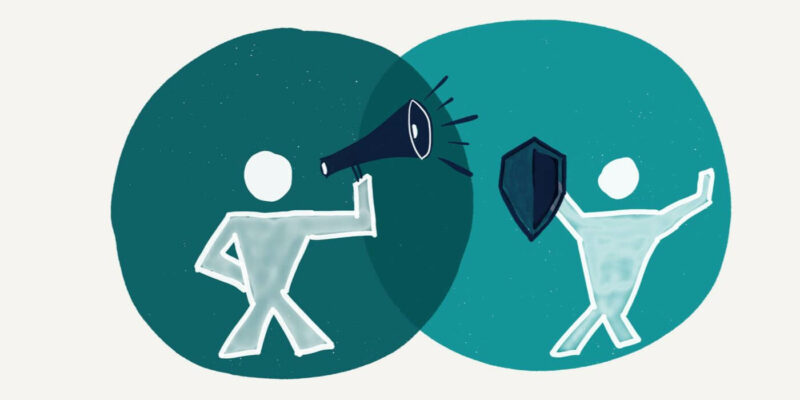Many people struggle with low self-esteem — a persistent belief that they’re not good enough, worthy enough, or not lovable.
And while most of us assume low self-esteem is a fixed personality trait—something they’re stuck with for life—nothing could be further from the truth:
When you understand what really causes low self-esteem, you can take steps to improve it.
What follows are 7 common signs of low self-esteem. Learn to identify these in your own life and you’ll be on the road to cultivating healthier self-esteem.
1. You define yourself by your past.
Low self-esteem is often a failure of imagination.
If you’ve struggled with low self-esteem for much of your life, those beliefs and feelings of being less than are what you know best. And so they feel very real. On the other hand, imagining your future self with higher self-esteem feels distant and unreal. But here’s the thing…
How you feel about yourself is not always a very good indicator of your true value.
People with healthy self-esteem know that just because they feel bad doesn’t mean they are bad. They know that just because they’ve been one way in the past says nothing about how they are destined to be in the future. And they don’t overprioritize their past selves at the expense of their future selves.
When you define yourself by your past, you give away control over your future.
2. You procrastinate on your passions.
When you avoid the things that matter most, it’s often a sign that you don’t trust yourself.
Of course, we all procrastinate. But people with low self-esteem often have a strange pattern to their procrastination: They get the mundane, everyday stuff done on time (paying the bills, finishing those weekly reports, etc.) but they procrastinate on the activities they care most about (creative hobbies, travel, learning, fitness, etc.). And the reason…
When you have low self-esteem, you don’t trust yourself with your most important goals.
On the other hand, people with healthy self-esteem trust themselves to pursue their passions even if it means failure, mistakes, or frustrations. They’ve built up the confidence to go after the things that matter most to them despite the possibility of failure, embarrassment, or mistakes.
Healthy self-esteem means you define yourself by the pursuit of your passions, not the end results.
3. You’re hypercritical of others.
Being overly critical of others is usually a primitive strategy for boosting your own ego.
Obviously, we all need to think critically sometimes. But there’s a big difference between thinking critically and being critical:
Helpful criticism is about making the world a better place. Unhelpful criticism is about making yourself feel better.
People with low self-esteem have a hard time feeling good about themselves. This means that they sometimes get in the habit of criticizing others as a way to make themselves look better in comparison. For example: when you criticize someone’s opinion for being stupid, you’re implying that you’re smart—and that feels good.
The trouble is that being critical of others as a way to boost your own self-esteem is only temporary. And after that, you usually end up feeling even worse about yourself.
If you tend to be overly critical of others, ask yourself this:
When I criticize other people, am I trying to be genuinely helpful or am I trying to make myself feel better?
4. You’re unwilling to enforce healthy boundaries.
Boundary-setting issues are usually self-respect issues in disguise.
Most of us know that it’s important to set healthy boundaries, especially with difficult people in our lives. The trouble is, even if we set a healthy boundary, the hard part is enforcing it. And the reason…
If you don’t enforce boundaries, it’s because you value other people more than yourself.
But here’s the strange part: If you find yourself in this position—not having enough self-respect to enforce your boundaries—the best way to get it is to set and enforce healthy boundaries!
The trick is to start very small and work your way up. Work on returning that Starbucks drink they got wrong for a while then move your way up to saying no to your boss’ request that you work weekends again.
When you enforce a healthy boundary, you reinforce the belief that you matter just as much as anyone else.
5. You overthink minor decisions.
Indecision goes hand-in-hand with poor self-confidence.
Some decisions in life are hugely important and impactful—whom you choose to marry, whether to try heroin or not, quitting your job to start your own business. These are big-time decisions with big-time consequences. And it’s perfectly understandable for people to experience some mental back and forth between deciding.
But people with low self-esteem often treat even minor decisions as if the fate of the world rested on them.
This indecisiveness in even small decisions is often the result of low confidence in your own ability to make decisions. The key is to come to terms with the fact that you will make some bad decisions (or at least decisions that other people don’t like) and that in the end, that’s okay. Nobody dies if you choose pizza for dinner even though your family wanted Chinese.
Courage isn’t the absence of fear. Courage is the belief that you’ll be okay despite your fear.
6. You rely on other people to feel better.
Low self-esteem frequently manifests as chronic reassurance-seeking.
When we feel bad, we want to feel better. When we’re worried, we want to know that things will turn out alright. When we’re sad we want to feel happier and more energized. Unfortunately, many people get stuck in the habit of relying on other people’s reassurances in order to feel better. This is a problem because….
Reliance on others for emotional support leads to emotional fragility in the long-run.
Of course, we all benefit from the support of people around us. But when you rely on it, you give up the opportunity to practice those essential skills for yourself. And the result: low confidence in your own ability to handle stressors and challenges. And eventually, low self-esteem along with it.
There’s nothing wrong with asking for support when you really need it. But it’s unwise to rely on it.
7. You struggle to take compliments.
Difficulty taking compliments is often an indicator of low self-worth.
If compliments tend to make you uncomfortable and squeamish, it’s likely a sign that you either don’t think you deserve it or you’re worried that other people will think badly of you if you do. But whether you don’t respect yourself enough, or you respect other people’s opinions too much, the end result is the same: low self-esteem.
Taking compliments well means a healthy respect for yourself and the opinions of others.
Luckily, taking compliments well is something you can practice and get better at. Instead of making excuses for yourself or downplaying your achievements, taking a compliment well is often as simple as smiling and saying “thank you.” And the more you practice, the more you’ll start to believe that you are actually worthy of all those compliments you get.
A compliment accepted is a vote of confidence in yourself.
All You Need to Know
Of course, self-esteem is a complex phenomenon: there are many reasons why people can experience low self-esteem that aren’t listed here. And just because you exhibit some of these things doesn’t mean you have low self-esteem.
But if you do struggle with low self-esteem and aren’t sure why, the seven signs listed above may be useful in helping you better understand what habits and tendencies are contributing to your self-esteem issues.
And more importantly, they may give you a starting point for where to begin working to build healthy and high self-esteem.
One final thought: When it comes to building healthier self-esteem, don’t overthink it. As naval once said:
Self-esteem is just the reputation you have with yourself.





16 Comments
Add YoursTHANK YOU! VERY HELPFUL TO UNDERSTAND BOTH MYSELF AND OTHERS.
Thanks, Adriana! Glad it was helpful 🙂
As usual, you make my day. You give me strength and the ability to remind myself to continue the work to be a better person all around.
Aw, thanks for that Raquel!
This was such an eye opener very helpful and informative thank you
This makes total sense and explains a lot about me – thank you so much
Thank you. I agree with everything you say, especially about boundaries. We have the right to say “no”, however much the other person insists they’re being reasonable.
Hi nick. Thank you for this article. This really describes my wife dead on. However, in her case, the problem isn’t with identifying that she has low self esteem, but convincing her that low self esteem is not a good thing.
(Her side would be something like: not believing in myself is the opposite of arrogance, we must be selfless and not value ourselves. Others must come first.) Add to that that the “poor me” card is perceived as her source of power and the fear that being satisfied might void her power over others.
I was wondering, how would you work with that to even get her to perceive high/stable self-esteem as something to be desired rather than avoided? (P.S. She already became exceptionally successful in life and work, but she won’t let that change her self-judgment)
Naval with a capital N?
Lovely read
Hi Nick. There must be many other reasons for low self esteem but these basics can play a huge role in dealing with the big ones. Good read. Lynette.
Loved it! Thank you! I wish you could make these articles downloadable podcasts. I would love to listen to your articles or I wish I had more time so I could read them all.
Absolutely magic, thank you so much Nick. Something that I am actively trying to work on in both my personal and professional life. I am eagerly awaiting the next intake of your Emotional Fitness Bootcamp!
My own experience taught me that my self esteem start when “I do what I said that I’d do”. Many thanks
I like how you break concepts down into small, understandable, manageable chunks. Helps me understand where my action/inaction may be coming from. Thank you for writing so concisely and clearly.
Wow, got my number here Nick, very helpful to see it in front of me if that makes sense, thank you ????